【英语】百校联盟2018届TOP20四月联考(全国Ⅰ卷)英语试题 含答案
- 格式:doc
- 大小:365.00 KB
- 文档页数:17

全国名校大联考2017~2018学年度高三第四次联考英语第一节(共5小题;每小题1.5分,满分7.5分)听下面5段对话。
每段对话后有一个小题,从题中所给的A、B、C三个选项中选出最佳选项,听完每段对话后,你都有10秒钟的时间来回答有关小题和阅读下一小题。
每段对话仅读一遍。
1.How does the woman suggest going to New York?A.By plane.B.By train. C. By car2.When will the man leave?A.On September 3rd.B.On September 12th. C. On September 13th 3.What does the woman think of the trip?A.It’s disappointing.B.It’s fantastic. C. It’s dull4.What are the speakers talking about?A.Preparing for a meeting.B.Fixing a copying machine.C.Using a copying machine.5.How long did the woman wait alter work yesterday?A.One hour.B.Two hours.C.Three hours.第二节(共15小题;每小题1.5分,满分22.5分)听下而5段对话或独白。
每段对话或独白后有几个小题,从题中所给的A、B、C三个选项中选出最佳选项。
听每段对话或独白前,你将有时间阅读各个小题,每小题5秒钟;听完后,各小题给出5秒钟的作答时间。
每段对话或独白读两遍。
听第6段材料,回答第6、7题。
6.Where does the conversation probably take place?A.In a hotel.B.In a schoo1.C.In a shop.7.When will the pool open?A.At six o’clock tomorrow morning.B.At five o‘clock in the afternoon.C.At eight o’clock in the evening.听笫7段材料,同答第8拿10题。
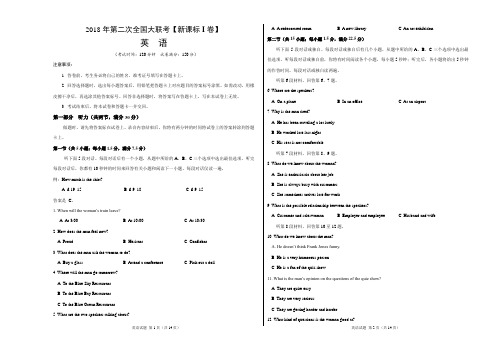
2018年第二次全国大联考【新课标I卷】英语(考试时间:120分钟试卷满分:150分)注意事项:1. 答卷前,考生务必将自己的姓名、准考证号填写在答题卡上。
2. 回答选择题时,选出每小题答案后,用铅笔把答题卡上对应题目的答案标号涂黑。
如需改动,用橡皮擦干净后,再选涂其他答案标号。
回答非选择题时,将答案写在答题卡上,写在本试卷上无效。
3. 考试结束后,将本试卷和答题卡一并交回。
第一部分听力(共两节,满分30分)做题时,请先将答案标在试卷上。
录音内容结束后,你将有两分钟的时间将试卷上的答案转涂到答题卡上。
第一节(共5小题;每小题1.5分,满分7.5分)听下面5段对话。
每段对话后有一个小题,从题中所给的A、B、C三个选项中选出最佳选项。
听完每段对话后,你都有10秒钟的时间来回答有关小题和阅读下一小题。
每段对话仅读一遍。
例:How much is the shirt?A. £ 19. 15.B. £ 9. 18.C. £ 9. 15.答案是C。
1. When will the woman’s train leave?A. At 3:00.B. At 10:00.C. At 10:30.2. How does the man feel now?A. Proud.B. Hesitant.C. Confident.3. What does the man ask the woman to do?A. Buy a glass.B. Attend a conference.C. Pick out a doll.4. Where will the man go tomorrow?A. To the Blue Sky Restaurant.B. To the Blue Bay Restaurant.C. To the Blue Ocean Restaurant.5. What are the two speakers talking about?A. A redecorated room.B. A new library.C. An art exhibition.第二节(共15小题;每小题1.5分,满分22.5分)听下面5段对话或独白。
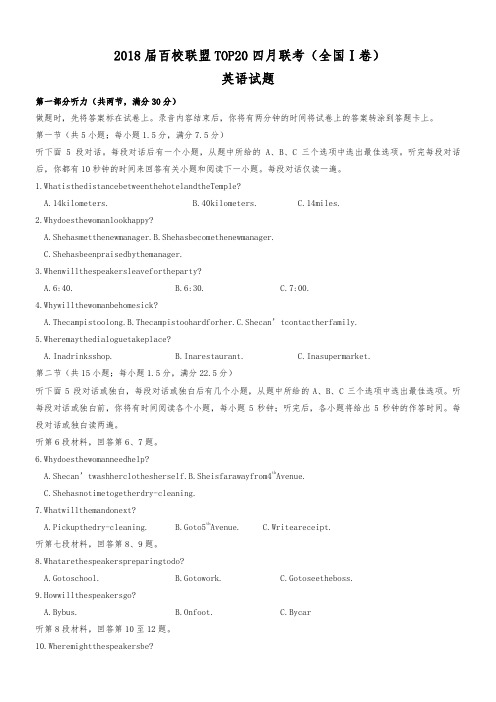
2018届百校联盟TOP20四月联考(全国Ⅰ卷)英语试题第一部分听力(共两节,满分30分)做题时,先将答案标在试卷上。
录音内容结束后,你将有两分钟的时间将试卷上的答案转涂到答题卡上。
第一节(共5小题;每小题1.5分,满分7.5分)听下面5段对话。
每段对话后有一个小题,从题中所给的A、B、C三个选项中选出最佳选项。
听完每段对话后,你都有10秒钟的时间来回答有关小题和阅读下一小题。
每段对话仅读一遍。
1.WhatisthedistancebetweenthehotelandtheTemple?听下面5听第6A.Pickupthedry-cleaning.B.Goto5th Avenue.C.Writeareceipt.听第七段材料,回答第8、9题。
8.Whatarethespeakerspreparingtodo?A.Gotoschool.B.Gotowork.C.Gotoseetheboss.9.Howwillthespeakersgo?A.Bybus.B.Onfoot.C.Bycar听第8段材料,回答第10至12题。
10.Wheremightthespeakersbe?A.Inacoffeehouse.B.Attheman’s home.C.Atthewoman’shome.11.Whendidthemandecidetomakehisowncoffee?A.Afterbuyingacoffeemaker.B.Afterrunningoutofinstantcoffee.C.Afterdrinkingrealcoffeeinacoffeehouse.12.Howwouldthewomanlikehercoffee?A.BlackB.White.C.Weak听第9段材料,回答第13至16题。
听第10第一节(共15小题;每小题2分,满分30分)阅读下列短文,从每题所给的A、B、C和D四个选项中,选出最佳选项。
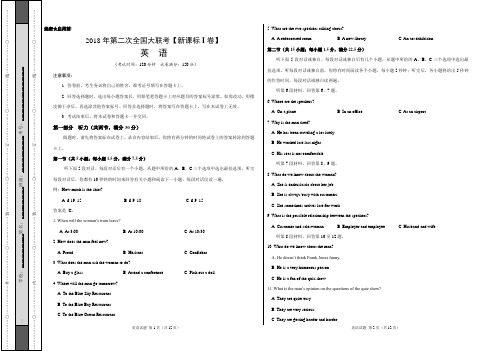
英语试题 第1页(共12页) 英语试题 第2页(共12页)绝密★启用前|2018年第二次全国大联考【新课标I 卷】英 语(考试时间:120分钟 试卷满分:150分)注意事项:1. 答卷前,考生务必将自己的姓名、准考证号填写在答题卡上。
2. 回答选择题时,选出每小题答案后,用铅笔把答题卡上对应题目的答案标号涂黑。
如需改动,用橡皮擦干净后,再选涂其他答案标号。
回答非选择题时,将答案写在答题卡上,写在本试卷上无效。
3. 考试结束后,将本试卷和答题卡一并交回。
第一部分 听力(共两节,满分30分)做题时,请先将答案标在试卷上。
录音内容结束后,你将有两分钟的时间将试卷上的答案转涂到答题卡上。
第一节(共5小题;每小题1.5分,满分7.5分)听下面5段对话。
每段对话后有一个小题,从题中所给的A 、B 、C 三个选项中选出最佳选项。
听完每段对话后,你都有10秒钟的时间来回答有关小题和阅读下一小题。
每段对话仅读一遍。
例:How much is the shirt?A. £ 19. 15.B. £ 9. 18.C. £ 9. 15.答案是 C 。
1. When will the woman’s train leave?A. At 3:00. B . At 10:00. C. At 10:30.2. How does the man feel now?A. Proud.B. Hesitant.C. Confident.3. What does the man ask the woman to do?A. Buy a glass.B. Attend a conference. C . Pick out a doll.4. Where will the man go tomorrow?A. To the Blue Sky Restaurant.B. To the Blue Bay Restaurant.C. To the Blue Ocean Restaurant.5. What are the two speakers talking about?A. A redecorated room.B. A new library.C. An art exhibition. 第二节(共15小题;每小题1.5分,满分22.5分)听下面5段对话或独白。
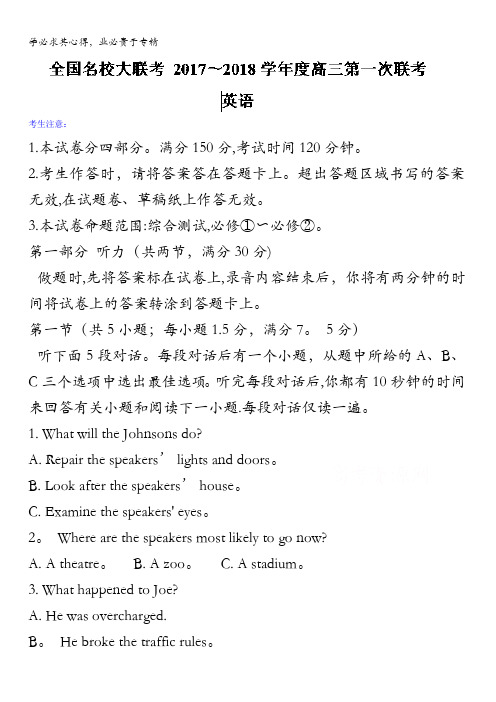
考生注意:1.本试卷分四部分。
满分150分,考试时间120分钟。
2.考生作答时,请将答案答在答题卡上。
超出答题区域书写的答案无效,在试题卷、草稿纸上作答无效。
3.本试卷命题范围:综合测试,必修①〜必修②。
第一部分听力(共两节,满分30分)做题时,先将答案标在试卷上,录音内容结束后,你将有两分钟的时间将试卷上的答案转涂到答题卡上。
第一节(共5小题;每小题1.5分,满分7。
5分)听下面5段对话。
每段对话后有一个小题,从题中所给的A、B、C三个选项中选出最佳选项。
听完每段对话后,你都有10秒钟的时间来回答有关小题和阅读下一小题.每段对话仅读一遍。
1. What will the Johnsons do?A. Repair the speakers’ lights and doors。
B. Look after the speakers’ house。
C. Examine the speakers' eyes。
2。
Where are the speakers most likely to go now?A. A theatre。
B. A zoo。
C. A stadium。
3. What happened to Joe?A. He was overcharged.B。
He broke the traffic rules。
C. He hurt himself accidentally。
4. What are the speakers arguing about?A. The importance of liberation。
B。
The position of women in society,C。
The planning for career.5. Why doesn’t the woman hire a gardener?A. To cut down the expenses.B。
To kill the spare time。
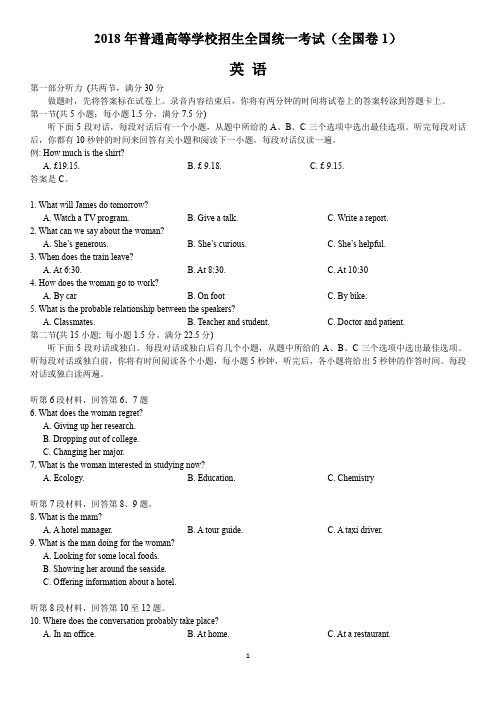
2018年普通高等学校招生全国统一考试(全国卷1)英语第一部分听力(共两节,满分30分做题时,先将答案标在试卷上。
录音内容结束后,你将有两分钟的时间将试卷上的答案转涂到答题卡上。
第一节(共5小题;每小题1.5分,满分7.5分)听下面5段对话,每段对话后有一个小题,从题中所给的A、B、C三个选项中选出最佳选项。
听完每段对话后,你都有10秒钟的时间来回答有关小题和阅读下一小题。
每段对话仅读一遍。
例: How much is the shirt?A. £19.15.B. £ 9.18.C. £ 9.15.答案是C。
1. What will James do tomorrow?A. Watch a TV program.B. Give a talk.C. Write a report.2. What can we say about the woman?A. She’s generous.B. She’s curious.C. She’s helpful.3. When does the train leave?A. At 6:30.B. At 8:30.C. At 10:304. How does the woman go to work?A. By carB. On footC. By bike.5. What is the probable relationship between the speakers?A. Classmates.B. Teacher and student.C. Doctor and patient.第二节(共15小题; 每小题1.5分。
满分22.5分)听下面5段对话或独白。
每段对话或独白后有几个小题,从题中所给的A、B、C三个选项中选出最佳选项。
听每段对话或独白前,你将有时间阅读各个小题,每小题5秒钟,听完后,各小题将给出5秒钟的作答时间。
每段对话或独白读两遍。
第一部分听力(共两节,满分30分)做题时,先将答案标在试卷上。
录音内容结束后,你将有两分钟的时间将试卷上的答案转涂到答题卡上。
第一节(共5小题;每小题1.5分,满分7.5分)听下面5段对话。
每段对话后有一个小题,从题中所给的A、B、C三个选项中选出最佳选项。
听完每段对话后,你都有10秒钟的时间来回答有关小题和阅读下一小题。
每段对话仅读一遍。
1. What is the distance between the hotel and the Temple?A. 14 kilometers.B. 40 kilometers.C. 14 miles.2. Why does the woman look happy?A. She has met the new manager.B. She has become the new manager.C. She has been praised by the manager.3. When will the speakers leave for the party?A. 6: 40.B. 6:30.C. 7:00.4. Why will the woman be homesick?A. The camp is too long.B. The camp is too hard for her.C. She can’t contact her family.5. Where may the dialogue take place?A. In a drinks shop.B. In a restaurant.C. In a supermarket.第二节(共15小题;每小题1.5分,满分22.5分)听下面5段对话或独白,每段对话或独白后有几个小题,从题中所给的A、B、C三个选项中选出最佳选项。
听每段对话或独白前,你将有时间阅读各个小题,每小题5秒钟;听完后,各小题将给出5秒钟的作答时间。
2018年高考全国Ⅰ卷英语试题注意事项1答卷前考生务必将自己的姓名、准考证号填写在答题卡上。
2回答选择题时选出每小题答案后用铅笔把答题卡上对应题目的答案标号涂黑。
如需改动用橡皮擦干净后再选涂其他答案标号。
回答非选择题时将答案写在答题卡上写在本试卷上无效。
3考试结束后将本试卷和答题卡一并交回。
第一部分听力共两节满分30分做题时先将答案标在试卷上。
录音内容结束后你将有两分钟的时间将试卷上的答案转涂到答题卡上。
第一节共5小题每小题1.5分满分7.5分听下面5段对话。
每段对话后有一个小题从题中所给的A、B、C三个选项中选出最佳选项。
听完每段对话后你都有10秒钟的时间来回答有关小题和阅读下一小题。
每段对话仅读一遍。
例How much is the shirt?A. £19.15.B. £9.18.C. £9.15.答案是C。
1. What will James do tomorrow?A. Watch a TV program.B. Give a talk.C. Write a report.2. What can we say about the woman?A. She‟s generous.B. She‟s curious.C. She‟s helpful.3. When does the train leave?A. At 6:30.B. At 8:30.C. At 10:30.4. How does the woman go to work?A. By car.B. On foot.C. By bike.5. What is the probable relationship between the speakers?A. Classmates.B. Teacher and student.C. Doctor and patient.第二节共15小题每小题1.5分满分22.5分听下面5段对话或独白。
第Ⅰ卷第一部分:听力(共两节,满分30分)第一节(共5小题:每小题1.5分.满分7. 5分)听下面5段对话。
每段对话后有一个小题,从题中所给的A、B、C三个选项中选出最佳选项,并标在试卷的相应位置,听完每段对话后,你都有10秒钟的时间来回答有关小题和阅读下一小题,每段对话仅读一遍。
例:How much is the shirt?A. £19.15.B. £9.15.C. £9.18.答案是B。
1. Where does this conversation most probably take place?A. In a library.B. In a theater.C. In a classroom.2. What is the probable relationship between the two speakers?A. Doctor and nurse.B. Cashier and customer.C. Dentist and patient.3. What is the time now by Shelly’s watch?A. 2:55.B. 3:00.C. 3:05.4. What does the man mean?A. He needs some change.B. He seldom counts his money.C. He doesn’t have that much cash.5. What does the man remember of Sally?A. She used to be in poor health.B. She was somewhat overweightC. She was popular among boys.第二节(共15小题;每小题1.5分,满分22.5分)听下面5段对话或独白。
毎段对话或独白后有几个小题,从题中所给的A、B、C三个选项中选出最佳选项,并标在试卷的相应位置。
2018年普通高等学校招生全国统一考试(全国卷1)英语第一部分听力(共两节,满分30分做题时,先将答案标在试卷上。
录音内容结束后,你将有两分钟的时间将试卷上的答案转涂到答题卡上。
第一节(共5小题;每小题1.5分,满分7.5分)听下面5段对话,每段对话后有一个小题,从题中所给的A、B、C三个选项中选出最佳选项。
听完每段对话后,你都有10秒钟的时间来回答有关小题和阅读下一小题。
每段对话仅读一遍。
例: How much is the shirt?A. £19.15.B. £ 9.18.C. £ 9.15.答案是C。
1. What will James do tomorrow?A. Watch a TV program.B. Give a talk.C. Write a report.2. What can we say about the woman?A. She’s gener ous.B. She’s curious.C. She’s helpful.3. When does the train leave?A. At 6:30.B. At 8:30.C. At 10:304. How does the woman go to work?A. By carB. On footC. By bike.5. What is the probable relationship between the speakers?A. Classmates.B. Teacher and student.C. Doctor and patient.第二节(共15小题; 每小题1.5分。
满分22.5分)听下面5段对话或独白。
每段对话或独白后有几个小题,从题中所给的A、B、C三个选项中选出最佳选项。
听每段对话或独白前,你将有时间阅读各个小题,每小题5秒钟,听完后,各小题将给出5秒钟的作答时间。
第一部分听力(共两节,满分30分)做题时,先将答案标在试卷上。
录音内容结束后,你将有两分钟的时间将试卷上的答案转涂到答题卡上。
第一节(共5小题;每小题1.5分,满分7.5分)听下面5段对话。
每段对话后有一个小题,从题中所给的A、B、C三个选项中选出最佳选项。
听完每段对话后,你都有10秒钟的时间来回答有关小题和阅读下一小题。
每段对话仅读一遍。
1. What is the distance between the hotel and the Temple?A. 14 kilometers.B. 40 kilometers.C. 14 miles.2. Why does the woman look happy?A. She has met the new manager.B. She has become the new manager.C. She has been praised by the manager.3. When will the speakers leave for the party?A. 6: 40.B. 6:30.C. 7:00.4. Why will the woman be homesick?A. The camp is too long.B. The camp is too hard for her.C. She can’t contact her family.5. Where may the dialogue take place?A. In a drinks shop.B. In a restaurant.C. In a supermarket.第二节(共15小题;每小题1.5分,满分22.5分)听下面5段对话或独白,每段对话或独白后有几个小题,从题中所给的A、B、C 三个选项中选出最佳选项。
听每段对话或独白前,你将有时间阅读各个小题,每小题5秒钟;听完后,各小题将给出5秒钟的作答时间。
每段对话或独白读两遍。
听第6段材料,回答第6、7题。
6. Why does the woman need help?A. She can’t wash her clothes herself.B. She is far away from 4th Avenue.C. She has no time to get her dry-cleaning.7. What will the man do next?A. Pick up the dry-cleaning.B. Go to 5th Avenue.C. Write a receipt.听第七段材料,回答第8、9题。
8. What are the speakers preparing to do?A. Go to school.B. Go to work.C. Go to see the boss.9. How will the speakers go?A. By bus.B. On foot.C. By car听第8段材料,回答第10至12题。
10. Where might the speakers be?A. In a coffee house.B. At the man’s home.C. At the woman’s home.11. When did the man decide to make his own coffee?A. After buying a coffee maker.B. After running out of instant coffee.C. After drinking real coffee in a coffee house.12. How would the woman like her coffee?A. BlackB. White.C. Weak听第9段材料,回答第13至16题。
13. What was the reason for the woman’s not sleeping well?A. Her dog barked all night.B. She was too tired.C. Her dog looked like a wolf.14. Which of the following say “Buz z”?A. Birds.B. Dogs.C. Bees.15. How does a bird make sounds in English?A. Jiji.B. Tweet.C. Weng.16. What are the speakers talking about?A. Different animals in England and China.B. Different pronunciations in English and Chinese.C. Different animal sounds in English and Chinese.听第10段材料,回答第17至20题。
17. For what did the speaker go to Hong Kong?A. Holiday.B. Business.C. Study.18. What was the speaker probably doing at 3:00 am?A. Drinking in the bar.B. Watching TV.C. Sleeping.19. How did the speaker get to the airport at last?A. By bus.B. By taxi.C. On foot.20. How long did the speaker wait at the airport?A. 5 hours.B. 6 hours.C. 7 hours.第二部分阅读理解(共两节,满分40分)第一节(共15小题;每小题2分,满分30分)阅读下列短文,从每题所给的A、B、C和D四个选项中,选出最佳选项。
ADay 1 ArrivalUpon arrival in Kunming, your Kunming tour guide will wait for you at the airport and help you to transfer to the hotel.Day 2 KunmingDay 3 Kunming →Dali (by air)21. What might the tourists be doing at 11 : 00 on the second day?A. Preparing for lunch.B. Relaxing in the hotel.C. Going to the Stone Forest.D. Visiting the Flower and Bird Market.22. What are the tourists recommended to do for evening activities in Kunming?A. To watch Dynamic Yunnan.B. To enjoy the local food.C. To buy handmade crafts.D. To wander about in the city.23. Why are tourists recommended to hike to the top while visiting Dali?A. Because it takes little effort to hike to the top.B. Because they can get full view of the old town.C. Because it is the only site to enjoy the scenery.D. Because they can take pictures of the three pagodas.BWhen I was about 5 years old, I experienced my very first random act of kindness. I was sitting at the roadside one evening, crying alone for some reason when suddenly, a boy came up to me and gave me a plastic rose, I remember the moment when I took the rose from his hand; I was smiling from ear to ear, whispering “I want to be like him”to myself as I watched him walking away.From then on, I made it as my life mission to do random acts of kindness whenever I can. I was very determined to make other people smile. That was the only reason why I joined my school’s Red Crescent Society and became a volunteer. Unfortunately, not everyone thinks in the same way as I did. Whenever I do something nice to others, people around me will start to judge my actions. Often I will just keep quiet and ignore what they say, but every once in a while, they do drive me up the wall.These people like to complain about how humans nowadays are lacking of humanities and compassion. However, when they actually see somebody doing a good deed in front of them, they start to question and criticizethat person’s honesty. Perhaps it is the increasing crime rate and the never-ending rat race that caused them to be so suspicious to nice strangers. In other words, people nowadays have lost sight of the real meaning of kindness and just let it go unnoticed. That is why I think random acts of kindness are really important. These selfless acts are not only capable of bringing joy to the recipients but also to the givers. Because of this, I want to help spread the idea of these random acts to the whale world.I want to show the people how the little things they give could make a big difference in someone else’s life.24. What was the influence of the boy’s rose on the author?A. It made the author feel ashamed.B. The author decided to follow suit.C. The author said a lot to the boy.D. It gave the author strength and hope.25. Why did the author join the school’s Red Crescent Soci ety?A. To be a volunteer.B. To live a happy life.C. To make others smile.D. To have a good time.26. Which can replace the underlined phrase in paragraph 2?A. Make me very angry.B. Bring difficulty to me.C. Force me to climb the wall.D. Force me to the dead corner.27. What can be inferred from the third paragraph?A. Rats are always running on the streets.B. Those who do good deeds are respected.C. The author feels sad about other people.D. Trust between people is decreasing.CCorporate culture is the values and beliefs a company develops over time. The role of corporate culture is to improve a company’s mission andstrategies, with long-term hopes of improveme nts in a company’s profit. Mostly corporate culture comes from a company’s top man agement.One role of corporate culture is to influence employee behavior, honesty, and compliance(服从). A company does not have to necessarily create a direct influence for these actions. A direct influence may be a set of written regulations or other policies, and while these may be in place, the corporate culture is usually more of an indirect influence.While many companies try to create corporate culture through the use of written policies, its role is harder to define. The human factor has an influence on how corporate culture is expressed. The way upper management acts and reacts to various situations defines how lower-level employees will act, and this aspect may be more important than any written policy.A company’s corporate culture can also extend beyond the walls of the business. Consumers who believe a company to be honest and forthright (直率)may be more loyal in their buying behavior. Employees in a company’s customer service department can also exhibit p ositive corporate culture to outside individuals. In this case, the culture creates a link between the company’s e mployees and its customers. How customers react may be a direct res ult from the company’s corporate culture.Product quality can also be influenced by a company’s corporate culture. Companies that focus only on profits may decide to avoid high-quality materials in products, but try to suggest that the products are of higher quality than they really are. This negative culture can then result in lower brand loyalty with consumers.28. What do we know about corporate culture from this passage?A. It is a set of rules and regulations.B. It is the way the employees act.C. It is the values and beliefs of a company.D. It is thelong term hope of a company.29. Which of the following is more efficient in creating corporate culture?A. Making a set of rules and regulations.B. Setting an example for the employees.C. Learning the corporate culture regularly.D. Encouraging the employees to work harder.30. What can we infer from the fourth paragraph?A. The customer is always right.B. Corporate culture has different functions.C. Without corporate culture, a company will die.D. Positive corporate culture can promote sales.31. Which word can describe the companies mentioned in the last paragraph?A. Creative.B. Efficient.C. Dishonest.D. Disloyal.DFeelings often run high where insects are concerned, with many people even sick when seeing them, let alone touch or swallow them. And yet insects present a huge nutritional opportunity as an increasing global population seeks more sources of food and feed.Insects have generally high levels of animal protein and key micronutrients with lower environmental footprints than traditional alternatives, and they can be raised on leftovers. But cultural, social and economic problems remain, reports an article published today in Nutrition Bulletin.“Inse cts present a nutritional opportunity, but it is unclear how their nutritional quality is influenced by what they are fed,”says Darja Dobermann, a researcher at the University of Nottingham. “In ideal conditions, insects have a smaller environmental impact than most traditional western forms of animal protein; less known is how to raiseinsect production while maintaining these environmental benefits.”“Studi es overall show that insects could make valuable economic and nutritional contributions to the food or feed systems, but there are no clear regulations in place to bring insects into such supply systems without them turning into a more expensive version of poultry(家禽)for food,” says Dobermann.The article highlights how insects have been a source of food for hundreds of years in more than 100 countries with over 2,000 species that can be eaten; in central Africa, up to 50% of dietary protein has come from insects, with their market value higher than many alternative sources of animal protein.Insects need to be large enough to make the effort of catching them worthwhile and easy to locate, preferably in predictably large quantities. They are consumed at various life stages, as raw, fried, boiled, roasted or ground food.32. Which of the following is the advantage of raising insects for food?A. It will offer people work opportunities.B. It is environmentally friendly.C. It will replace traditional food.D. It will result in less leftovers33. What can be inferred from Dobermann’s words?A. Raising insects for food has become popular.B. Raising insects can’t solve food problems.C. More should be done to raise insects for food.D. More money can be made by raising insects.34. What does the underlined word in paragraph 4 stand for?A. Insects.B. Regulations.C. Feed systems.D. Supply systems.35. Which is the possible title of this passage?A. How to Raise InsectsB. Raising Insects for MoneyC. Insects Seem No Longer UglyD. A New Source of Food第二节(共5小题;每小题2分,满分10分)根据短文内容,从短文后的选项中选出能填入空白处的最佳选项。